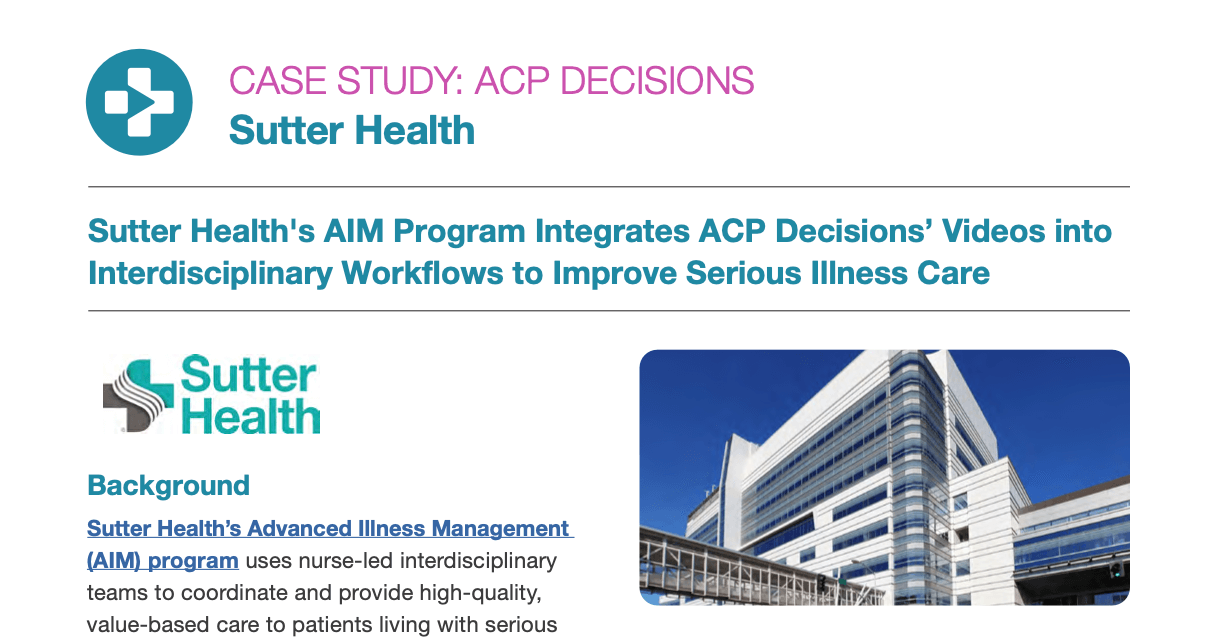
Sutter Health’s AIM Program Integrates ACP Decisions’ Videos into Interdisciplinary Workflows to Improve Serious Illness Care
Published December 14, 2022
Reading Time: < 1 minute In this Case Study Sutter Health’s Advanced Illness Management (AIM) program uses ACP Decisions’ Video Library as part of a nurse-led interdisciplinary team that provides high-quality, valued-based care to patients living with serious illness. To learn more click here to download the Case Study.

Dual Eligible Beneficiaries: 6 Things to Know
Published August 22, 2022
Reading Time: 3 minutes Dual eligible beneficiaries are among the most vulnerable patient populations in the United States. While policymakers and health plans recognize the need to address the complex care needs of these individuals, it can be challenging to understand their unique situations and the variety of factors that elevate their risk. Here are six things to know[…]

7 Tips to Avoid Medicare Advance Care Planning Denials
Published August 9, 2022
Reading Time: 3 minutes Medicare began reimbursing providers for advance care planning (ACP) in 2016 to promote better health outcomes. While the number of claims has grown each year, the prevalence of physicians having end-of-life care discussions with their Medicare patients has remained low. Despite the numerous benefits of providing ACP services, a recent study published in Health Affairs[…]

Getting Reimbursed for Advance Care Planning
Published July 28, 2022
Reading Time: 4 minutes People who have a serious illness or are facing the end of life may be unable to make their own decisions about the medical treatment and care they want. Unfortunately, only an estimated one-third of Americans have any type of advance directive on file so their healthcare providers can carry out their end-of-life care wishes.[…]

4 Virtual Visit Best Practices for Serious Illness Conversations
Published April 27, 2022
Reading Time: 3 minutes As COVID-19 infections surged in 2020, the U.S. federal government stepped in with policy waivers to help overcome the biggest obstacles to telehealth, and medical associations released practice guidelines. Within weeks, there was as much as a ten-fold increase in virtual doctor visits. The increased adoption of telehealth revealed the enormous potential of telehealth to[…]

3 Strategies to Increase the Uptake of Advance Care Planning
Published August 25, 2021
Reading Time: 3 minutes Advance care planning (ACP) allows patients to express their goals and preferences for future medical and serious illness care. Advance directives are an essential component of ACP, as they consist of the legal documents – a living will, a medical power of attorney, and Physician Orders for Life Sustaining Treatment (POLST) – that enable a[…]

The Goals-of-Care Conversation: A Best-Practice, Step-By-Step Approach
Published January 15, 2021
Reading Time: 6 minutes Engaging patients in meaningful goals-of-care discussions is critical to providing patient-centered, individualized care. High quality care can only be achieved when a patient’s care is aligned with their goals, preferences, and values. A JAMA Internal Medicine review concluded that best practices for a goals-of-care conversation include: “sharing prognostic information, eliciting decision-making preferences, understanding fears and[…]

Goals-of-Care Conversations: Making the Most of Your Discussions
Published January 4, 2021
Reading Time: 4 minutes Goals-of-care conversations are the best way to discover a patient’s health care wishes and ensure goal-consistent care. When executed well, these discussions elevate the clinician-patient relationship, opening the door to trust, open communication, and shared decision making. In clinical practice, good communication techniques promote patient-centered care and are a cornerstone for conducting effective goals-of-care discussions.[…]

Goals-of-Care Conversations: 3 Ways to Improve Your Skills
Published October 15, 2020
Reading Time: 3 minutes Goals-of-care conversations help patients with serious illness clarify what they value most and what they hope to see happens with their medical care. Clinicians can use this information to formulate a plan of care around a patient’s values and preferences. Quite often, patients – particularly if they have recently been diagnosed with an illness or[…]

How to Integrate Patient Decision Aids into Clinical Practice
Published August 18, 2020
Reading Time: 3 minutes Achieving patient-centered care requires shared decision making to take place between the healthcare provider and patient. One of the best, evidenced-based interventions for achieving meaningful conversations that engage patients to make informed decisions is the practice of using patient decision aids (PDAs). In fact, there are more than 100 published studies that support the use[…]

A Planning Checklist: Do Your Homework Before Implementation
Published April 22, 2020
Reading Time: 4 minutes Quality improvement (QI) initiatives are key to improving clinical outcomes, enhancing patient experience and reducing costs within healthcare organizations. However, an estimated 70% of large-scale change programs fail. Unfortunately, performance improvement efforts that are poorly executed result in very little – if any – sustainable change, while using up time, money and resources. There is[…]

35+ Considerations for Facilitating an ACP Initiative in an Ambulatory Setting
Published January 8, 2020
Reading Time: 5 minutes Facilitating an improvement initiative in an outpatient practice setting brings its own set of questions and issues that must be addressed. While there are similar considerations related to implementation in hospital and ambulatory settings, there are challenges and barriers unique to the smaller practice environment. To follow is a series of questions that can be[…]

35+ Considerations for Executing an ACP Initiative in an Inpatient Setting
Published December 19, 2019
Reading Time: 5 minutes Successful implementation of an improvement initiative in a hospital environment typically involves many key stakeholders, clinical and technical considerations, as well as end-users. With so many clinical factors and technical details to manage, it is important to address the right questions at every stage of implementation. Below are a series of considerations your team can[…]

Implementation Series: Identifying Opportunities for Better Clinical Workflows
Published December 4, 2019
Reading Time: 4 minutes This four-part implementation series explores expected challenges healthcare organizations may encounter when adopting an improvement initiative. Each article provides tips for effective implementation based on our experience working with organizations to successfully execute an advance care planning initiative. The first installment took a closer look at the challenge of training clinicians to develop the skills[…]

How to Improve Clinician Engagement through Training
Published November 6, 2019
Reading Time: 4 minutes This four-part implementation series explores expected challenges healthcare organizations may encounter when adopting an improvement initiative. Each article provides tips for effective implementation based on our experience working with organizations to successfully execute an advance care planning initiative. The first installment takes a closer look at clinician training for developing the skills necessary to effectively[…]

How to Communicate More Clearly with Your Patients & Members
Published October 18, 2019
Reading Time: 4 minutes How often do patients really comprehend what they are being told when their doctor explains a medical condition or procedure? Not often enough. A recent study found that only 5% of cancer patients had an accurate understanding of their prognoses. Unfortunately, if a patient is not clear about their treatment options or does not understand[…]

5 Tools to Maximize the Effectiveness of Your PDSA Cycles
Published September 30, 2019
Reading Time: 3 minutes Plan-Do-Study-Act (PDSA) is a quality improvement method that healthcare teams use to quickly and efficiently test new interventions. This concept involves structured, iterative tests of change. The simplicity of this experimental learning method means that it can be applied to many different situations. While PDSA is easy to follow, it is not meant to be[…]

Getting the Conversation Started: Tips for Clinicians
Published July 6, 2019
Reading Time: 4 minutes For many clinicians, broaching the topic of serious illness is challenging. It’s not easy to share the news of a poor prognosis and to witness the pain of the patients and families on the receiving end. Having a conversation near the end of life can feel like an acknowledgement that the care provided has failed. […]

Getting the Conversation Started: Tips for Family Members, Friends and Caregivers
Published June 17, 2019
Reading Time: 4 minutes Conversations about death and serious illness are not easy to have. Even though about 90% of people believe that talking about end-of-life decisions is important, only 27% report actually doing so. It’s true: it can be uncomfortable and awkward to bring these topics up with someone you care about. However, finding a way to discuss what kind[…]

Champions of Advance Care Planning
Published March 18, 2019
Reading Time: 3 minutes Advance care planning (ACP) doesn’t just happen. It’s not a conversation most people want to have. They find it uncomfortable and awkward. Yet, the ACP process is critically important to ensuring people receive the care they want during a time they cannot speak for themselves. ACP promises a better quality of life when facing serious illness and[…]

4 Best Practices for Effective Shared Decision Making
Published May 26, 2018
Reading Time: 3 minutes Most of us live in a world full of choices – ranging from the most mundane to complex, life-changing decisions. Undoubtedly, healthcare decisions are among the most significant we may make at some point. Often, when the time comes to make important medical decisions, many people are overwhelmed and unable to fully comprehend all their[…]

5 Ways To Jump Start Your Advance Care Planning Initiative
Published May 15, 2018
Reading Time: 4 minutes Whether your healthcare organization has an advance care planning initiative in place or is still in the discussion phase, you may find the process has stalled and needs a jump-start. National Healthcare Decisions Day (NHDD) is a perfect time to focus on and reinvigorate an advance care planning program. National Healthcare Decisions Day (NHDD) National[…]
